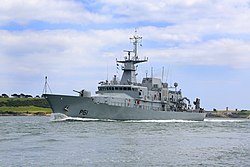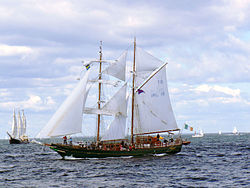| Name | Image | Type | Notes |
|---|
| SS Dainty | | Salvage tug/Patrol sloop | STOIC-class tug built in Chepstow in 1918 for the Admiralty. She had a length of 142 feet, displaced 459 GRT, and armed with a 12-pounder gun. Sold to French interests, renamed SS Cherbourgeois. [53] |
| PV Muirchú |  | Patrol vessel | Launched in 1908 as HMY Helga (Pendant No 064). Armed with a 12-pounder gun. Disarmed and transferred to Department of Agriculture and Fisheries for fisheries protection. |
| John Dunn (Adty No 3741) |  | Mersey-class trawler | The Mersey trawlers were a class of over 100 naval trawlers built for the Royal Navy during World War I. The trawlers were 148 feet in length, displaced 438 long tons, a crew of 15, a speed of 11 knots, and armed with a 12-pounder gun. |
| John Dutton (Adty No 3739) |
| William Honnor (Adty No 3796) |
| Robert Murray (Adty No 4256) |
| Thomas Thresher (Adty No 3572) |
| Christopher Dixon (Adty No 3563) |
| TR.24 |  | TR series trawler | The TR trawlers were a Canadian version of the Castle-class trawler built by Canadian Vickers, Montreal during World War I. The trawlers were 133 feet 10 inches in length, displaced 275 long tons, a crew of 15, a speed of 10 knots, and armed with a 12-pounder gun. |
| TR.25 |
| TR.27 |
| TR.29 |
| TR.30 |
| TR.31 |
| Inishirrer (Official No. 135637) | | Drifter | Built in Arklow in 1913, she was 65 feet in length and was assessed at 51 GRT. [54] [55] Acquired from Congested Districts Board in August 1922. Armed with machine guns |
| John S Summers (Official No 125960) (Admiralty No 2147) [56] | | Built in Lowestoft in 1910, she was 77 feet length and assessed at 62 GRT. [57] Was hired by Royal Navy as a net vessel during World War I. [58] Armed with machine guns |
| ML1 |  | Motor Launch | Four ELCO motor launches were acquired in May 1922 for the Marine Investigations Department. ML2 sank off Cornwall in July 1922 while being delivered. The launches were 80 feet in length, with a displacement of 37 long tons, a crew of 8, a speed of 19 knots, and armed with a 3-pounder gun. [59] |
| ML2 |
| ML3 |
| ML4 |
| 190 |  | Steam pinnace | A pinnace is a type of ship's boat. They were 50 feet in length, displaced 14.4 long tons, a speed of 12 knots, and armed with machine guns. [60] |
| 199 |























